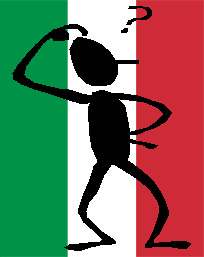Italian Quiz! Here you will find short quizzes about the Italian language: rules, curiosities, idioms. If you are interested in a specific topic, let me know via the contact page.
Were you looking for basic, intermediate, advanced online tests? Go to the dedicated page

An Italian says “Non vedo l’ora”. What does that mean?
An Italian says “Sei fuori?”. What does that mean?
An Italian responds by saying “Boh”. What does that mean? means?
“Chiodo scaccia chiodo” is a very common Italian saying. Do you know what it means?
“Avere le mani in pasta”. Do you know what that means?
Another very common Italian saying: “In bocca al lupo”. Do you know its meaning?
A very common Italian expression: “A occhio e croce”. What does that mean? How and when is it used?
Another very common Italian saying: “Avere la faccia tosta”. Do you know what that means?
Let’s look at a very common Italian saying: “Piove sul bagnato”. Do you know what that means?
Another Italian expression that you can hear. “Che macello!” But what does it mean?
The past participle is used in compound verbs such as the present near, future, compound conditional etc…
> Verbs in -are have the past participle in -ato: for example: parlare → parlato
> Verbs in -ere have the past participle in -uto: ex: sapere → saputo
> Verbs in -ire have the past participle in -ito: ex: gestire → gestito
But is it always like this?
There are Italian expressions that are very typical, and you hear them all the time in colloquial Italian. “Uffa” is one of those but do you know what it means?
In Italian, it is often possible to omit the article before the name. Do you want to try?
“Piuttosto che” is a conjunctive phrase in the Italian language. It has a specific use, but it is often misused. Let’s see how well you know her?
Regarding formality, in Italian you can use “Lei” when addressing people older than you. “Lei” is also part of the feminine personal pronouns. But what happens if we talk to a man?
Prepositions are invariant words used to connect the constituents of a sentence.
Italian words with doubles are more frequent than you might think. Can you tell them apart?
“Permesso?” how to use this verb
What color are your pants?
Plural of Italian words that end in -gia and -cia
Did you like the Italian Quiz? Do you want to improve your language knowledge? Contact us
Test powered by Quiz Maker